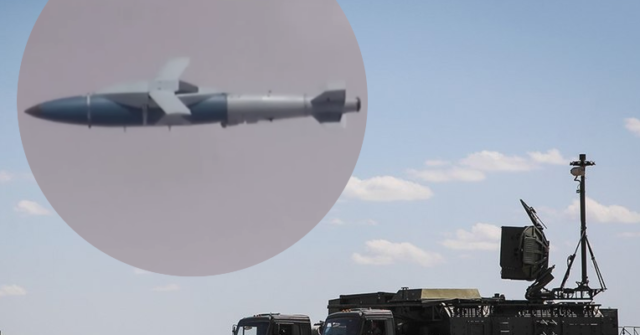The rollout of an innovative munition that combines a traditional air-dropped ‘dumb’ bomb with a modern, GPS-guided set of deployable wings to allow precision strikes has seen a troubled start in Ukraine, with user error and Russian interference apparently blamed for dud drops.
The Joint Direct Attack Munition, Extended Range (JDAM-ER) is an Australian-American-developed guided bomb described as a “low-cost, long-range, precision strike weapon” that frees aircraft deploying from having to fly over their targets so directly. This particular development of the concept, which entered service with Australia in the last decade, goes beyond the otherwise Vietnam-era bomb casing having the addition of GPS-guided vanes to help it fall to the right place by also adding a pair of deployable wings, allowing the otherwise unpowered munition once dropped to glide onto its target, trebling its range to 45 miles.
Russia Accused of Jamming GPS Signals During Major NATO Wargames https://t.co/8mNv92CgL0
— Breitbart London (@BreitbartLondon) November 13, 2018
This munition is a relatively new addition to Ukraine’s arsenal, and compared to some other celebrated or mundane weapons given to and used in great quantities by Ukraine and has been little discussed until now. But the purported leak of U.S. Department of Defence intelligence briefing pages and slides that has apparently rocked Washington in the past week, clearly indicates the innovative gliding bomb system has had a rocky start in Ukraine.
The “classified” briefing slide which, if real and undoctored, discusses the poor first deployment for the JDAM-ER in Ukrainian hands in frank terms. Two reasons for these “duds and/or misses” given boil down to either operator error — rectifiable through improved training — or enemy action.
In the first instance, the slide illustrates parts of the arming process demonstrating how incorrectly configured JDAM-ERs are being dropped with their fuses inadvertently unarmed, allowing the munition to glide down to its target but not explode on impact. The slide says steps have already been taken to ensure the weapon arms properly upon launch in future.
Dealt with in considerably more detail, however, is the possibility that misses by the otherwise precision strike weapon are occurring in theatre because Russia is jamming the weapon’s GPS guidance system. The briefing document appears to imply this is a matter of some internal debate, with the Director of the Joint Navigation Warfare Centre making the rather optimistic-sounding assessment that: “GPS jamming should have not affected the JDAM-ER strikes” and suggested other factors may be at play.
Finland Summons Russian Ambassador Over GPS Signal Jamming https://t.co/hISbd1rZgg
— Breitbart London (@BreitbartLondon) November 19, 2018
Yet of the nine JDAM-ERs cited as having been dropped by the Ukrainian Air Force to date, the leaked document claims that “medium to high confidence that 4/9 weapons have missed due to [Russian] GPS jamming effects”, indicating a near-50-50 failure rate.
Underlining the impact Russian signal jamming is having on the impact of modern U.S.-produced weapons in Ukraine, the document stated that it is a “high priority… that those jammers are disrupted/destroyed… to the maximum extent possible” before the weapon is used again. Interestingly the document also notes that such GPS jamming has also been observed as being successful “sometimes” with a guided rocket system, GMLRS, deployed to Ukraine.
Despite this gloomy assessment of the weapon’s use so far the slide makes a bid to prop up confidence in the relatively new extended-range glide kit, writing in prominent colour-emphasised-text “JDAM-ER isn’t ‘failing’.”
As previously reported, while extremely accurate in full military use GPS signals are ultimately just radio traffic and are consequentially reasonably easy to spoof or block. Breitbart London said of Russian efforts to develop GPS jamming in 2022:
…a sophisticated attack can even mimic the satellites and spoof a location, causing the device to believe it is somewhere else.
This is not mere speculation. Even before Russia’s surge in Ukraine, GPS spoofing has been within the technical competence of the more determined sort of university student and the modern, digital navigation equipment of ships transiting the Black Sea mysteriously malfunctioning in the past suggested the Russians have been testing an anti-GPS weapon for some years.
Now war in Ukraine is back, Russia — and quite possibly Ukraine — are jamming GPS and other navigational signals to deprive their enemy of navigation and weapons targeting.
More recently, Russia has boasted through state media of the sophistication of its GPS-blocking technology.
Discussion of the effectiveness of Russian GPS-jamming is just one of dozens of revelations of varying interest revealed by the leaked documents, which the Washington military-media establishment appears to be treating as genuine. Among the key points are the apparently parlous state of Ukraine’s air defence systems which are said to be running low on ammunition, that Special Forces troops of several NATO nations are deployed in Ukraine, and that a British spy plane came close to being shot down by a Russian jet last month.
A 21-year-old Air National Guardsman who worked in an intelligence role has been identified as a potential source of the leaks. The FBI has made an arrest, nearly a week after the news of the leaks came to national prominence.
Norway: Russia Jamming GPS Signals ‘A New Challenge’ https://t.co/yMLNHJALC7
— Breitbart London (@BreitbartLondon) February 11, 2019


